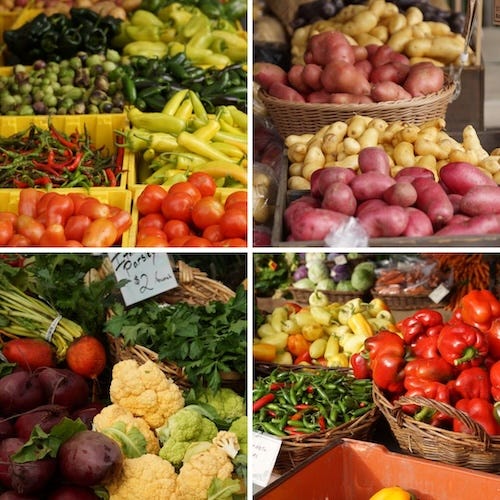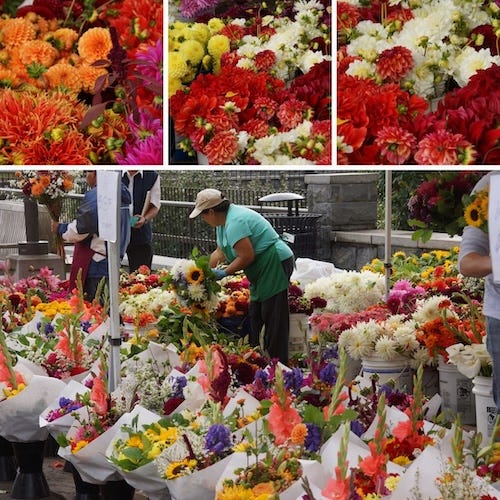It’s May … and in my area, that means Farmer’s Market time!
Our local Farmer’s Market operates the second weekend in May through the second weekend in October. Oh, how I love weaving my way through several dozen shops, each carrying unique and wonderful things.
Like the booth run by two retired women who are growing and selling unusual veggies to the world. All of it is organic, and they have stretched my culinary skills as I snap up their offerings.
Or the lavender booth that sells everything from culinary lavender to pillow sachets you can hide away in your drawers. Is there anything better than a Gorgeous surprise?
Last year, I met a man who runs a small plant-based market on the other side of town. He brought his plant-based cheeses to market to introduce his wares to a new audience. Mmm … they were fantastic! I bought several selections more than once; they made Gorgeous additions to my picnic baskets I packed up for the local concerts.
Are you a Farmer’s Market shopper? Have you thought much about it?
I’ve heard so many conversations about the benefits they have within the community. I overheard one couple leaving - “Too expensive,” they said as they left with nothing in their hands. Another family was loading a wagon with goods - “Supporting small farms is a big deal!” They were so excited!
I fall into the latter. Because buying fresh produce from a local farmer goes a long way toward supporting Mother Earth.
I remember my first trip to Europe. We stayed in small communities, and utilized local markets for our food. Oh, did we notice a difference! Biting into a tomato, a peach, or even an apple did something to my taste buds. Wow – I couldn’t believe the taste!
Why was it so different than back home?
So, I researched it. And have thought A LOT about it.
Very little of our food comes from our local region. You might have better luck in the summer months, but in the heart of the winter, your fruits and veggies come from halfway around the world. It has to be transported from that country to ours, through customs to a warehouse where it’s delivered to a grocery store. And FINALLY, to the shelves where I can buy it and bring it home.
It is estimated that the food that shows up on your plate here in the US travels about 1,500 miles before it winds up on your table. (That’s average, some are shipped much further.) That’s a big deal.
Long-distance transportation consumes large quantities of fuel, which generates greater quantities of carbon dioxide emissions. Some forms of transport pollute more than others.
In order to be transported, it must be picked long before it’s ripe. Depending on its purpose at its final destination, it is gassed to “ripen” after transport, or highly processed using preservatives, irradiation, or other means to keep it stable for transport and sale. Here is where genetic modification can take place in so many ways to ensure foods make it to market.
No wonder these fruits and veggies no longer taste like fruits and veggies!
Now compare that to fresh produce picked a day or two before, and immediately brought to market. It’s allowed to ripen on the vine and tastes, oh, so good.
Are you sold on visiting farmer’s markets? Do you frequent them yourself?
Before I provide you with a “shopping guide” to make the most of your shopping experience, let’s talk about a few of the benefits of shopping there.
Benefits of shopping at farmer’s markets
You meet the farmers
If you stick with smaller farmer’s markets, you’ll most likely meet the families who care for the produce, the farm, and the soil year-round. Talk with them. Ask them questions. You’ll discover more about food and what to do with it even with simple conversations.
I love this personal experience. They might alert you to what they’ll be bringing in the coming weeks. You may even get a better idea of how to cook with something, or how to incorporate it into your recipes. I’ve shopped at some of my local farms for years – they keep coming back year after year. It’s like saying hello to an old friend.
You get ideas for cooking
I love experimenting with new-to-me foods. But sometimes you look at something and think … What do I do with that? If they have a moment, farmers are happy to give you ideas. They’ve chosen to grow it for a reason, so they’re equally delighted to give you ideas on how to use it.
It also creates shoppers year after year. One of my local farmers brings nopales and fava beans – they’re in season right now. Most shoppers scratch their heads, wondering what to do with them. These aren’t native to my Pacific Northwest community. By asking questions and doing a little research, I find new foods to love and play around with. They’re so yummy! Gorgeous!
You get the freshest food
This is a no-brainer. When you buy something they picked the day before, you’ll notice it in the flavor. You’ll see it in the way it folds into your recipes. And you’ll notice it in your health! Good nutritious food makes a healthier body!
Gives you new things to try
I make it a point to look for foods I’ve never tried before. If I don’t recognize something, I ask about it. And there’s always a story behind it.
This is an amazing way to try new things. It also gives you an excuse to do a little research and figure out ways to incorporate it into your meals. Most of these foods will only be available for a few weeks at most, so you can play around with your meal options and then savor them for the season. (And look forward to them when they show up the next season!)
It’s not all about food
Of course, farmer’s markets bring out the best in everyone. I LOVE the flowers that show up. Plus, these flowers are also local, meaning they grow in neighboring communities. You can ask about pesticides and discover unique ways to display them.
The lavender farms bring dried bouquets of lavender, making everything from sachets to body balms available.
Local organic wineries are there to give shoppers a taste.
And I mentioned my local plant-based cheesemaker above - how fun it is to find these local people in my own community.
Several nurseries come in the spring, offering unique plants for the garden. I purchased a German cantaloupe variety I’m excited to nurture this season.
Honestly, if you haven’t been to a farmer’s market lately, I highly suggest you find one near you and head out to experience what they offer. If you don’t enjoy one, find another. They each have their own appeal.
Secret tips for making your shopping experience better
Farmer’s markets are pretty flexible and easy to navigate. But if you’re new to the concept, let me share a few tips that took me a while to learn.
Take a lap first
It’s easy to get excited at the first booth. The piles of produce make you want to purchase a little bit of everything. Yet when you walk to the next booth, you may find something you like better.
Especially at a new market, I always complete a lap and take in the entire market. It gives me a sense of what each booth offers, compare prices, and even check out where they’re from.
Because I attend my local one every week, I tend to know who everyone is and what they usually bring. I grab quickly from my favorites. But even then, I’m often surprised by what a booth further down has to offer.
Bring cash
Most farmers have a way of paying by card these days. But cash can often make things a lot easier. I typically use a card when I’m loading up on food, and use cash when I’m buying ones and twos. The bottom line here is: be prepared.
Talk with the stand owner
Farmer’s markets can be big business. Not every stand is built exclusively for a local farm; some come from great distances and bring food from a variety of sources.
When I shop, I have my favorites. I love the little local organic farm from just down the road. They work hard to ensure they remain pesticide-free, and always have unusual foods for me to try. The owners are fun to talk with and always grateful for the business.
The more you shop, the more you’ll learn about the businesses you buy from frequently. That’s good! It’s getting back to source.
Plan your meals
Oh, are farmer’s markets tempting. You can quickly turn a shopping trip for a few items into bags of finds you had no intention of buying. That’s not always a bad thing … but it is if you can’t use it and you throw it all away.
Especially if you’re new to plant-based foods. It all looks so good!
Take some time before you shop and plan out your meals for a week. That helps you remember the late-night meetings where you know you’ll eat out. Or the days you simply won’t have time to cook a big meal. It helps you make better selections while shopping, ensuring nothing goes to waste.
Stop the waste
It often comes as a big surprise how quickly farmer’s market food can go to waste. Without preservatives or irradiation techniques, your lettuce will wilt, and strawberries move to mush.
Be conscious of what you buy. I also buy food produce savers to add life to foods inside your refrigerator. And when things start to fade, I wash them, cut them up, and pop everything into the freezer for later use. A lot of it ends up in my morning smoothies – yum!
Arrive early … or late
Want the best produce? Arrive early. You’ll be first in line to make your selections.
Looking for a bargain? Some farmers will discount what’s left at the end of the day rather than bringing it home. I’m NOT in favor of bargaining with farmers – they work hard at what they do and should get a fair price for their food. That said, produce has a short shelf life, and many would rather sell it at a discount than deal with it when they get home.
You’re ready to go …
It’s fairly easy to find local farmer’s markets in your area. But if you need a few ideas for finding one that appeals to you, give these sites a try.
The USDA has a food directory to help you find local farmer’s markets, food hubs, or on-farm markets.
Local Harvest allows you to search based on your geographical location.
Local Farm Markets allows you to find farm stands in your local area.
You can always do a Google search too.
Then bring a bunch of bags, load up the car with your kids, and plan on spending some time at your next market. You’ll love what you find. And it may just change your approach to Good Food.
p.s. Did you like this message? It would mean a lot to me if you’d press the ❤️ below if you liked it, left a comment 💬, or shared it with a friend. I’m trying to grow this publication, and I depend on people like you to do so!
And if you’re new here, Welcome! 💐 I’d love to start sharing my message with you if you’re interested in all things plant-powered, proaging, or finding kitchen joy. Subscribe … and then explore my entire archive! Glad to share with you! 🙋🏼♀️









